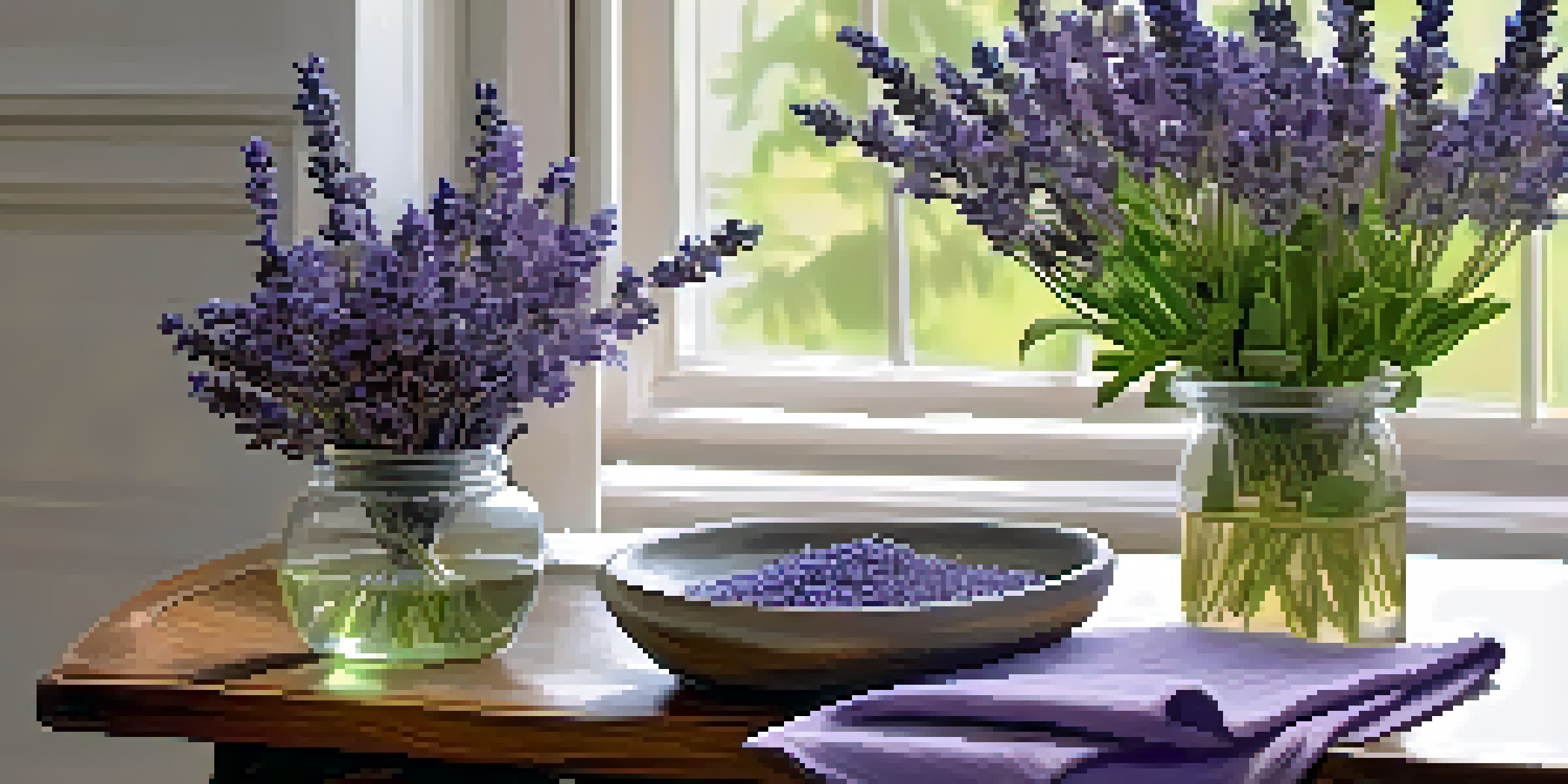Common Essential Oils Used in Naturopathic Aromatherapy

What Are Essential Oils and Their Benefits?
Essential oils are concentrated plant extracts that capture the natural scent and beneficial properties of their source. They are often used in aromatherapy to promote physical and emotional well-being. The aromatic compounds in these oils can influence mood, alleviate stress, and even support physical health.
The earth has music for those who listen.
Each essential oil has unique properties; for instance, lavender is known for its calming effects, while peppermint can invigorate and energize. These oils are often used in various applications, from diffusing in a room to adding to baths or massage oils. Understanding these benefits can help you choose the right oils for your needs.
In naturopathic aromatherapy, the focus is on using these oils to support the body's natural healing processes. By harnessing the power of nature, practitioners aim to enhance overall health and emotional balance, making essential oils a valuable tool in holistic wellness.
Lavender: The Calming Essential Oil
Lavender essential oil is perhaps the most well-known for its soothing properties. Often used to promote relaxation, it can be particularly helpful for those struggling with anxiety or insomnia. Just a few drops in a diffuser or on a pillow can create a calming atmosphere.

Beyond its calming effects, lavender also has antiseptic properties, making it beneficial for minor burns and insect bites. It’s like having a first-aid kit in a bottle! Many people find that incorporating lavender into their nightly routine improves their sleep quality.
Essential Oils Promote Well-Being
Essential oils are concentrated plant extracts that enhance physical and emotional health through various applications.
Whether you’re looking to unwind after a long day or simply enjoy a peaceful environment, lavender essential oil is a staple in naturopathic aromatherapy. Its versatility and pleasant scent make it an essential oil that many people keep on hand.
Peppermint: The Invigorating Essential Oil
Peppermint essential oil is celebrated for its refreshing and invigorating scent. This oil not only lifts your spirits but also has the potential to enhance mental clarity and focus. It can be particularly useful during moments when you need a little boost, like during a mid-afternoon slump at work.
Nature itself is the best physician.
Additionally, peppermint oil is known for its digestive benefits. A drop or two mixed with a carrier oil can help soothe upset stomachs or ease headaches. It’s like having a natural remedy for common ailments right at your fingertips.
Incorporating peppermint into your routine can be as simple as diffusing it while working or applying diluted oil to your temples. Its cooling sensation and uplifting aroma make it a go-to for those seeking both mental and physical relief.
Tea Tree Oil: The Antimicrobial Powerhouse
Tea tree oil is renowned for its powerful antimicrobial properties, making it a popular choice in naturopathic practices. It can help combat various skin issues, from acne to minor cuts and infections. Many people turn to this oil as a natural alternative to over-the-counter treatments.
In addition to its skin benefits, tea tree oil can also purify the air when diffused, providing a fresh and clean environment. Its distinctive scent can help mask unpleasant odors, making it ideal for use in homes or offices. Think of tea tree oil as nature's multi-tasker!
Diverse Benefits of Key Oils
Each essential oil, like lavender for relaxation and peppermint for invigoration, offers unique benefits that cater to different needs.
Using tea tree oil can be empowering, as it allows individuals to take an active role in their health. Whether you’re applying it topically or using it in a room spray, tea tree oil is a valuable asset in any essential oil collection.
Eucalyptus: The Respiratory Support Oil
Eucalyptus essential oil is commonly associated with respiratory health. Its refreshing scent can help clear nasal passages and promote easier breathing, making it a favorite during cold and flu season. A few drops in a hot shower or bath can create a spa-like experience right at home.
This oil is also known for its soothing properties, which can ease muscle tension and discomfort. Many athletes use eucalyptus oil in their post-workout routines for its cooling and revitalizing effects. It’s like a breath of fresh air for both your body and mind.
Incorporating eucalyptus into your daily routine can be as simple as adding it to a diffuser or mixing it with a carrier oil for massage. Its invigorating aroma not only supports respiratory function but also promotes a sense of clarity and focus.
Frankincense: The Spiritual Essential Oil
Frankincense essential oil has a long history of use in spiritual and meditative practices. Often referred to as the 'king of oils,' it is known for its grounding properties that can enhance mindfulness and emotional balance. Many people find that incorporating frankincense into their meditation routine deepens their practice.
Beyond its spiritual benefits, frankincense is also praised for its skin-rejuvenating properties. It can help reduce the appearance of scars and promote a more youthful complexion. Think of it as a natural beauty treatment that connects inner wellness with outer radiance.
Safe Use of Essential Oils
To enjoy the benefits of essential oils safely, it's crucial to dilute them and consult a healthcare professional when necessary.
Using frankincense can create a serene environment, whether through diffusion during meditation or applied topically in a diluted form. Its rich, warm aroma invites a sense of peace, making it a cherished oil in both spiritual and wellness circles.
Lemon: The Uplifting Essential Oil
Lemon essential oil is known for its bright, cheerful scent that can instantly uplift your mood. It’s like a ray of sunshine in a bottle! This oil is often used to combat feelings of fatigue and can help create a positive atmosphere in any space.
Additionally, lemon oil has cleansing properties that can purify both the air and surfaces. Many people use it in homemade cleaning solutions for a fresh, citrusy scent that also keeps their homes germ-free. It’s a simple way to incorporate the benefits of essential oils into your daily cleaning routine.

Incorporating lemon essential oil into your life can be as easy as adding a few drops to your water or using it in a diffuser. Its invigorating aroma not only enhances your mood but also contributes to an overall sense of well-being.
How to Safely Use Essential Oils
While essential oils offer numerous benefits, it’s important to use them safely to avoid any adverse effects. Always dilute essential oils with a carrier oil before applying them to the skin, as they can be potent and may cause irritation if used directly. Common carrier oils include coconut oil, jojoba oil, and sweet almond oil.
Additionally, always perform a patch test before using a new essential oil to ensure you don’t have an allergic reaction. Simply apply a small diluted amount to your wrist and wait for 24 hours to see how your skin reacts. This precaution can save you from unwanted surprises.
Lastly, consult with a healthcare professional if you’re pregnant, nursing, or have underlying health conditions before using essential oils. With the right approach, you can safely enjoy the healing benefits of essential oils in your naturopathic aromatherapy journey.